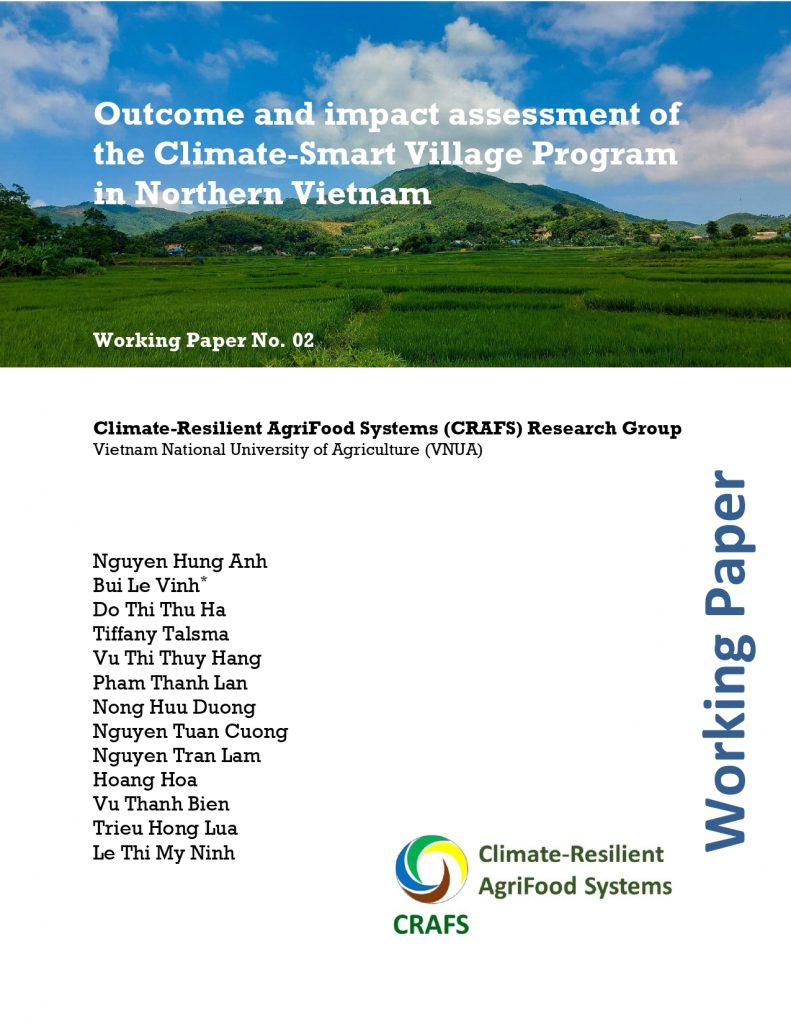Citation
Nguyen HA, Bui LV, Do TTH, Talsma T, Vu TTH, Pham TL, Nong HD, Nguyen TC, Nguyen TL, Hoang H, Vu TB, Trieu HL, Le TMN. 2022. Outcome and impact assessment of the Climate-Smart Village Program in Northern Vietnam. CRAFS Working Paper No. 02. Vietnam National University of Agriculture: Climate-Resilient AgriFood Systems (CRAFS) Research Group. Available online at: http://crafs.vnua.edu.vn/en/news/handle-123/
Permanent link to cite or share this item: http://crafs.vnua.edu.vn/en/news/handle-123/
*Corresponding author: Dr. Bui Le Vinh. Faculty of Natural Resources and Environment. Vietnam National University of Agriculture. Founder and leader of the CRAFS research group. Email: bui_le_vinh@yahoo.com, blvinh@vnua.edu.vn.
Abstract/Description
Yen Bai province inherits representative biophysical, socio-economic, smaller-holder farming characteristics to economic marginalization and climatic risks and impacts to agricultural production and local livelihoods of Vietnam’s northern mountain region (NMR). The CCAFS project deployed to Ma Climate-Smart Village (CSV) in Yen Bai in 2015 with bilateral funding support from two other research projects aimed at setting up a demonstration-for-scaling example of a rural community equipped with capacities for enhanced climate adaptation and resilience. This study applied a three tier interview data collection methodology (key informant interviews – focus group discussions – indepth farmer interviews) to thoroughly investigate 120 households about six main outcomes accomplished by the project up until 2021: (i) Overall changes in the village include improved crop productivity and thus household income; better access to information (eg. weather forecasts, tolerant varieties, etc.), knowledge (eg. technical training, internet-based extension materials, etc.) and resources (eg. loans); better coordination and cooperation among villagers in CSA and CSV actions and knowledge sharing. (ii) Improved farmer’s knowledge in CSA and CSV implementation is evidenced by the ability to strategize, plan and implement CSA solutions and sustainably maintain CSV activities by themselves. (iii) Improved perceptions of climate risks and their impacts help farmers proactively, correctly and quickly respond to risks. (iv) Women’s role in CSA and CSV implementation has been seen much more profound with at least 50% project participants being female farmers involved in all project activities. (v) Horizontal scalability of the CSV model automatically took place within Ma CSV when the CSA T&Ps were successfully tested by farmers and has spread now to neighboring villages to these days. (vi) A clear pathway for vertical scalability through policy has been initially achieved with a policy issued by the Yen Bai government based on some main project outcomes. Apparently, the project has achieved great outcomes from the village to the provincial levels. However, the project work still has a potential to be scaled to the National Target Program on New Rural Development (NTM) given its interest in developing resilient communities in climate-vulnerable regions across the country applying the CSV approach in its 2021-2025 strategy. Despite the closing of the CCAFS program by December 2021, this most important scaling pathway will be continued by the VIBE 2018.05 (funded by the Irish Aid) and COALESCE/2020/34 (funded by the Irish Research Council) under the management of Vietnam National University of Agriculture – a long-term strategic partner of the CCAFS program in the NRM.
Keywords:
Climate risks, impacts, Climate-Smart Village, adaptive capacities, outcomes, scalability, resilience, Vietnam
CRAFS Key Author ORCID iDs
Hung Anh Nguyen: https://orcid.org/0000-0002-0568-2835
Le Vinh Bui: https://orcid.org/0000-0003-1336-317X
CRAFS Research Area
Climate-smart agriculture
Contributes to SDGs
SDG 13 – Climate action
Country
Vietnam

 Tiếng Việt
Tiếng Việt
